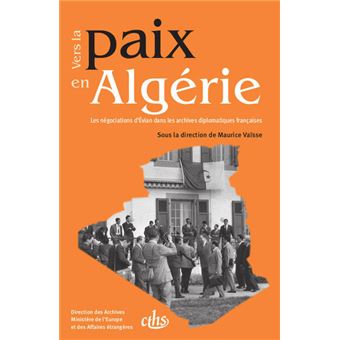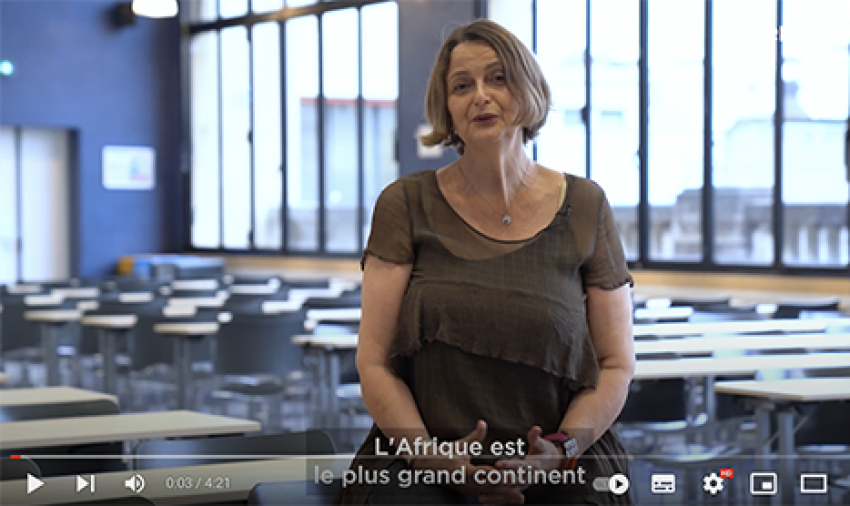Call for Applications IEG Fellowship in Digital Humanities
IEG FellOwship Digital Humanities
Application deadline: April 18, 2022
For a fellowship beginning in September 2022 or later
The Leibniz Institute of European History (IEG) in Mainz awards one fellowship for a period of six to eight months for international doctoral students in the field of Digital Humanities.
Further information can be found on IEG website : www.ieg-mainz.de/en/fellowships
"Vers la paix en Algérie" - Présentation d'ouvrage et table ronde
À l’occasion de la publication aux éditions du CTHS de l’ouvrage

Vers la paix en Algérie
Les négociations d'Evian dans les archives diplomatiques françaises
François Plaisant, président de l’association des Amis des Archives diplomatiques a le plaisir de vous inviter
Jeudi 10 mars 2022 à 18h00
à la Mairie du 15e arrondissement, 31, rue Péclet
Présentation de l’ouvrage
par Nicolas Chibaeff, directeur des Archives diplomatiques
et Christophe Marion, délégué général du CTHS
Avec Chantal Morelle, professeur en classes préparatoires aux grandes écoles,Suivie d’une table ronde,
animée par Maurice Vaïsse, professeur émérite des universités,
Sadek Sellam, historien, et le témoignage de François Plaisant, ancien membre de la délégation française aux pourparlers d’Evian
Inscriptions (normalement avant le mercredi 9 mars 12h)
L'Afrique est un laboratoire de la modernité

 Actualité Sciences Po
Actualité Sciences Po
Call KADOC Fellow 2022
KADOC Fellowships on Religion, Culture and Society (1750-)
KADOC, the Interfaculty Documentation and Research Centre on Religion, Culture and Society at KU Leuven, is one of the leading cultural heritage institutions in Belgium and an international research centre focusing on the societal legacies of religion and its material and immaterial manifestations in modern society.
The Centre’s impressive collection of archives and books documents the impact of religion on a variety of aspects of modern culture and society, in Flanders and internationally. KADOC’s research initiatives embrace innovative methods and deal with many different themes: gender, transnationalism and regionalism, imagination and practices, popular religion, intercultural exchanges, religion and science, religious entrepreneurship, subalternity, religious conflict and tolerance… KADOC considers international exchanges with innovative scholars working on these fields as vital for achieving its mission.
KADOC- KU Leuven yearly awards one fellowship to an international scholar (M/F/X) with max. 10 years of scientific seniority after PhD working on topics related to its main research fields. This programme offers the selected candidate the opportunity to work in its collections, to establish new scholarly links, and to broaden her/ his expertise in close interaction with Leuven scholars and heritage professionals.
The KADOC research fellowship on religion, culture and society 2021 was granted to Dr. Paul Glen Grant of the University of Wisconsin- Madison. During his research stay in May-July 2022 he will valorize the rich archival collections of KADOC to study the ways European and North American missionaries, especially those active in Congo between 1960 and 1965, learned to receive Christian teaching and charitable care from Congolese Christians.
For the coming years, the KADOC fellowship programme centers on the following themes:
2022: Religion and the margin: care and emancipation
2023: Religion, globalisation and international solidarity
2024: Religion, social ideas and policy
In our 2022-call we would like to express a particular interest in candidates researching the multifaceted social commitment of religious actors in the 19th and 20th centuries, for instance in health care, poor relief, popular education, care provisions for vulnerable and indigent people. We particularly welcome scholars researching the motives, specific nature and significance of this religiously motivated social agency, and how this was reflected in (public) discourses, strategies, and imagery. We are particularly interested in comparative or transnational research.
What we offer
- a unique opportunity to pursue research while living and working for two to max. three months in Leuven. KADOC offers a stimulating working environment.
- a monthly stipend of € 500, covering the costs of living in Belgium.
- an intervention in your housing costs at the Leuven Great Beguinage for a max. of 800 euro/month.
- close interaction with and support from scholars and professionals connected to the Centre. Each fellowship holder will be assigned one or more mentors or ‘buddies’.
- easy access to the Leuven collections and research infrastructure, the rich archival and book collections of KADOC in particular.
- a well-equipped working-space and all necessary administrative and logistical support
What we expect
- motivated candidates with proven research expertise on the topic
- applicants should have obtained their first doctoral degree not more than 10 years before the deadline.
- a well-considered plan for your research-stay, linked to tangible and achievable goals. This plan should make clear how your fellowship interlinks with KADOC’s collections and can impact its research activities.
- KADOC-fellows will work at the Centre in Leuven and actively participate in KADOC’s research activities and networks, for instance by hosting a seminar or contribute to its publications.
- proficiency in English, demonstrated by publications and/or an official certificate.
KADOC-KU Leuven seeks to foster an inclusive environment where all talents can flourish, regardless of gender, age, religion, cultural background, nationality, sexuality or disability. We support our university’s commitment to social responsibility, diversity and inclusion.
Evaluation
Submitted applications will be evaluated and ranked by the Scientific Committee of KADOC.
This evaluation involves both the criteria ‘candidate’ and ‘research project’. The candidates will be assessed on their scholarly background, accomplishments and potential. The evaluation of the project plan will focus on its scientific quality and relevance, innovativeness and feasibility, and how the plan is embedded within the collections and expertise of the host institution.
How to apply
Candidates are invited to submit their application using the dedicated web-module before Friday 29 April > 5 p.m.
Notification
Candidates will receive formal notification of the reception of their application. They will be notified on the results of the evaluation procedure
no later than Friday 17 June 2021.
Questions?
Please contact Dr. Peter Heyrman, head of Research
DEADLINE FOR APPLICATIONS
29 April 2022 > 5 p.m.
TO BE AWARDED
one fellowship for a period of 2 to max. 3 months in the academic year 2022-2023
ANNOUNCEMENT OF THE RESULTS
17 June 2022
AAC | Prix de thèse "Valois" Jeunes chercheuses et chercheurs 2022
Prix de thèse « Valois » Jeunes chercheuses et chercheurs : appel à candidature Édition 2022
Créé en 2017 et porté par le Comité d’histoire du ministère de la Culture, le Prix de thèse « Valois » Jeunes chercheuses et chercheurs lance ce 1er mars 2022 sa nouvelle édition.
Ce prix, qui distingue trois thèses de doctorat pour leur qualité, leur originalité et leur apport essentiel aux politiques culturelles du ministère de la Culture, est une aide à la publication de la thèse. Le montant attribué à chaque thèse primée s’élève à 8 000 euros.
Le prix a pour objectif d’encourager les chercheurs dans leurs travaux portant sur tous les champs des politiques culturelles et des institutions qui les mènent. Quelles que soient les disciplines et les champs culturels : patrimoines, création, médias et industries culturelles, langues de France, les recherches porteront plus largement sur tous les aspects de ces politiques publiques : institutions, professions, socio-économie de la culture, etc. Les recherches éclaireront les politiques ministérielles sur le temps long. Elles aborderont les questions d’accès à la culture, de transmission des savoirs et de cohésion sociale et situeront les politiques culturelles dans l’ensemble des politiques publiques en faveur du développement des territoires, y compris avec une dimension comparatiste.
Les thèses doivent être rédigées en français et avoir été soutenues entre le 1er janvier 2021 et le 30 avril 2022.
La date limite de dépôt des candidatures est repoussée au 31 mai 2022 (procédure de candidature dématérialisée)
Plus d’information : Candidature et règlement du prix









